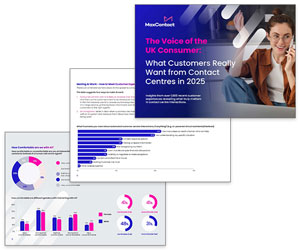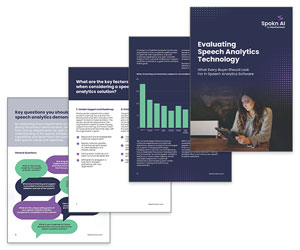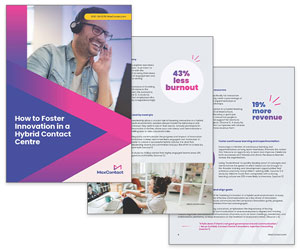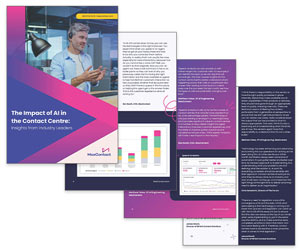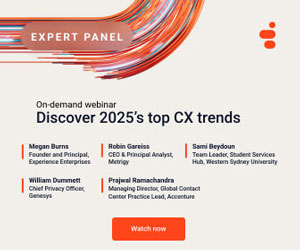They used to be called call centres, and now they’re called contact centres. There’s a good reason for the change. Today, customers want to contact you in the way that best suits them at any particular time.
Or to put it another way, they want the option of calling your customer service line to be one among many.
More customers want the option to email your support teams, send a quick text message (SMS), or use online chat. They also want to self-serve where possible. Providing these alternatives is one of the best ways to improve customer satisfaction.
Customers love a consistent, simple and connected experience on any channel, and so do your teams too.
It helps them improve customer service by giving advisors instant access to all correspondence between a client and your company. A good omnichannel solution should centralise all interactions, giving a complete view of customer engagement.
Bringing your voice and digital communications together in one place means you can serve customers faster and more satisfactorily. It helps your teams prioritise the most urgent enquiries.
If your current customer engagement software doesn’t offer these options, or does so only as an afterthought, you might be looking for something better.
Similarly, if your current engagement software is coming to the end of its contract, it’s time to explore the market. There may be a more efficient and cost-effective option out there than your current solution.
With that in mind, here are five things you must look out for when considering a new omnichannel contact centre solution.
Security and Integration
It goes without saying that your next omnichannel engagement software needs to be super-secure, but what does that mean in practice?
It certainly needs to give you the tools to ensure that you’re GDPR and Ofcom compliant, and you should check that it comes with the latest data security certifications. Think ISO27001 and Cyber Essentials.
If it’s a cloud-based system – and that comes with many benefits – make sure the infrastructure and data is housed in secure, compliant data centres.
If you take payments, you need to be even more picky. Look for a secure payments manager that ensures customer information is always protected, encrypted and anonymised with PCI certifications
Finally, contact centre software works best when it integrates seamlessly with other core applications, like your CRM or data management solutions, and uses the information to make your service better. Make sure that it allows for these integrations.
Flexibility and Scalability
Your needs change over time, but you don’t want to be upgrading your omnichannel engagement software every year. So can it scale as you do? Can it add new features and integrations when you need them?
In addition, the solution you choose needs to fit your requirements exactly. If you’re a debt collection agency, it’s not just about contacting customers, it’s about doing so compliantly.
Sales teams need an overall view of performance, plus insight at the individual level. Customer service departments have to be able to expand rapidly as the need arises, while at the same time ensuring quality levels remain high.
Your engagement software can help, if it has the relevant features. Ask any potential provider to demonstrate what it can offer in each area.
Flexibility is also about offering customers the communication channels they want. MaxContact currently offers SMS, email, WhatsApp, Messenger and web chat, alongside voice. Can your solution say the same?
Insights and Reporting
Knowledge is the key to effective contact centres, and your omnichannel engagement software needs to provide it.
That means effortless reporting using easy-to-create custom dashboards, giving you the information you need and nothing you don’t. You should be able to define key targets and visualise key data.
Ideally, you should be able to collect and view information in real time, whether that’s team performance or customer satisfaction, and really stay on top of your SLAs.
AI-driven speech analytics is another powerful tool for delivering customer insight, with automatic analysis of conversations, sentiment and emotion. Ask your provider if they have it, or if it is on their development roadmap.
Ease of Use
The easier the software is to operate, the more likely it is that your teams will make full use of all its tools and features and the quicker they’re productive.
So, is your chosen solution easy to navigate and intuitive to use? Or is it cluttered and confusing? If it’s the latter, it will undermine the efficiency of your teams, and make it far more costly to expand team numbers because of increased training requirements.
It’s also true that good software makes your users’ lives easier. It allows employees to meet their targets more easily, deal with difficult customers in the best way, and continually improve their knowledge and performance.
That’s good for your business, and also helps guard against employee burnout, something we’ve talked about at length.
Compliance
On top of everything, your contact software should help ensure that you’re always acting compliantly. ICO and Ofcom enforce strict regulations around the frequency and timing of calls and dealing with vulnerable customers, among other things.
Good omnichannel engagement software provides the tools to help you meet those requirements. That includes scripting solutions that let you create compelling and compliant scripts for every circumstance and edit them in seconds.
It should certainly include intelligent outbound dialling that blends dialling types to reduce dropped calls, and that automatically checks and integrates “no call” lists.
Other Things to Consider When Choosing an Omnichannel Engagement Software
Those are five key factors when considering a new engagement software solution, but they’re not the only things to think about…
- Hidden Costs: Are you paying a flat fee per user or do you get charged for additional features? For that matter, are you being charged for a demo, trial or proof of concept?
- Support: How easy is it to raise support tickets, and how long do they take to resolve?
- Expertise: Get to know your providers before you make a decision. Are they contact centre experts or just resellers? Do they have an inhouse team of developers?
- Accreditations: It’s great to be given the tools to operate compliantly, but are your providers acting compliantly themselves? Always check their accreditations.
This blog post has been re-published by kind permission of MaxContact – View the Original Article
For more information about MaxContact - visit the MaxContact Website
Call Centre Helper is not responsible for the content of these guest blog posts. The opinions expressed in this article are those of the author, and do not necessarily reflect those of Call Centre Helper.
Author: MaxContact
Published On: 31st May 2022
Read more about - Guest Blogs, MaxContact




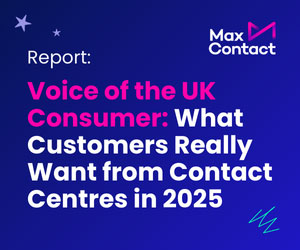

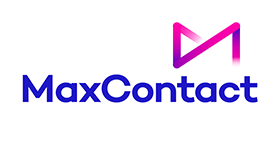 MaxContact is customer engagement software that goes above and beyond to build smarter customer experiences. Our platform is packed with powerful features, accessible for businesses large and small, and ensures organisations can operate compliantly.
MaxContact is customer engagement software that goes above and beyond to build smarter customer experiences. Our platform is packed with powerful features, accessible for businesses large and small, and ensures organisations can operate compliantly. 




